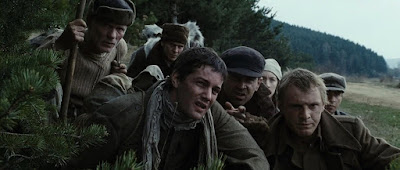Written at the time of the film's release...
 "Use the Gizzard, Luke"
"Use the Gizzard, Luke"
or
"Not So Much 'Hoo' as 'What' and 'Why'"
I loves me my fantasy films. You give me a good fantasy film, and I'm back to being 5 years old, giddy with the possibilities of a world-view that has no knowledge of mortgages, property tax, paralyzing self-doubt, and Glenn Beck.* Innocence makes a comeback, the world seems simpler, and it gives us something to aspire to besides not hitting the "Snooze" alarm in the morning. I miss those pre-cynical days.
Which is why a lot of the current crop of kids' flicks leaves me cold. Harry Potter used to be fun, but they've gotten increasingly dark and creepy, and they're going to end with an inevitability that's telegraphed and a bit morose (and I wouldn't be surprised if the last one were just a black screen). I mean, c'mon, the kid has an invisibility cloak and flies a broomstick for crying out loud, what's he got to be depressed about? The Star Wars films were fun before Darth Freud came waltzing in, then they careened into the side of the Death Star trench—impressively, one must say, but they weren't too much fun trying to present their civics lessons.
One goes into these things with that same innocence. Tell me a story. Gladden my eyes. Charm me. Seduce me. Make me not think about the $10 admission and the two hours I'm wasting of my too-short life. Give me something new and let me walk out with a spring in my step and a song in my heart, and maybe...maybe...a fresh, better way of looking at the world. We don't have to be friends, just don't make me regret the time I spent with you. I'm easy. I came to buy.
So, an animated owl movie sounds like just the ticket. I like owls, even though they're predators. They impress me, and I've enjoyed a couple of them as neighbors. But, Legend of the Guardians: The Owls of Ga'hoole (they needed the post-colon part, as the title couldn't be more generic) left me wanting to repeal the Endangered Species Act. Yeah, I know, the thing's popular with kids, but I remember kids used to like Clutch Cargo, which was the lowest form of animation there was.
The story is Template No.2 in the Fantasy genre—ostracized something-or-other must prove its worth against big, bad oppressors, while putting aside its childhood loyalties in some small way. But I couldn't help but think the authors just did a cut-and-paste job putting owls into Star Wars (yes, they really DO say "Use the gizzard" as a euphemism for instinct). The complete lack of anything original in the plot can sometimes be overcome by clever film-makers with style. Zack Snyder, as successful as he can be adapting other media—specifically graphic media—to a cinematic form, seems to be up a tree when making the leap from prose to image. Now, I'm sure there will be some parent out there who'll read this and immediately take umbrage ("My child LOVED this movie!!"**) and want to go on the attack, as if I was writing this with their precious issue particularly in mind. For all you potentially psychotic parents, I don't question your child's taste (although I'd be willing to bet they were as fidgety as the kids I saw it with—and as I was—and I'd also wager that if they liked it, it was because they were familiar with the source material, and would be happy if there were a Ga'hoole breakfast cereal consisting of twigs and feathers), but this is a BAD movie. Really bad. A reasonable child can like bad stuff (I loved the TV-show "Supercar" as a kid—which was a marionette show about a flying car, and I never questioned why all the cars were convertibles—so I speak from experience), but this is cotton candy movie-making, spun to give an ephemeral surge of interest, but with zero nutritional value (perhaps the calories should be posted in the End-Credits, I didn't stay to find out). When one considers how much time and money has been spent digitizing (one hesitates using the word "creating") this exercise, you begin to fantasize staking yourself out in a field, wearing a mouse-suit ("Come and get me, owls, you can't do anything worse than you already have!!). Better to salve your inner child with a daily dose of Babe, or Charlotte's Web.
If your child does drag you to this mess, I would suggest texting your friends throughout the entire movie...or even watching another movie.
I can't help but think that Ga'Hoole is a cynical writer's malaprop of "Go to Hell."
* The problem with re-posting old reviews is that there are references the reader might not have any clue about—like Glenn Beck who used to be somebody. Billy Wilder ran the same danger when he put in topical references into his movies. Unless he was very careful, 50 years on people wouldn't know what he was talking about, cultural-reference-wise.
** I still remember the time some parent castigated me for hating Speed Racer. The movie sucked...and it's a deeply cynical thing to show a child. I'm unremorseful in my assessment. (2021 Update: I'll be re-posting reviews of Speed Racer and Watchmen next week).























